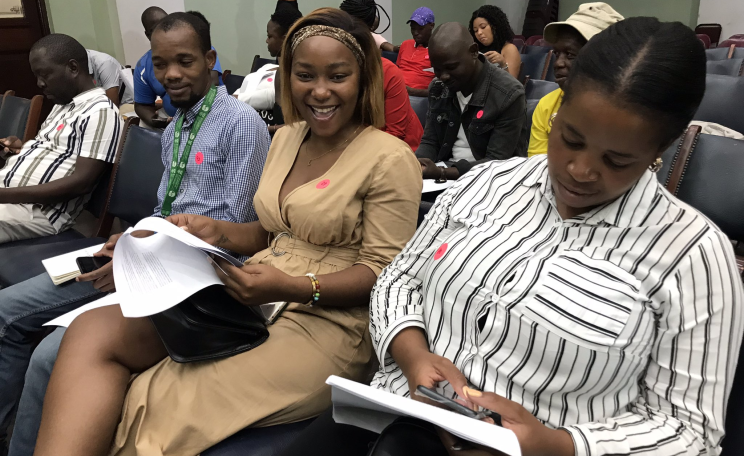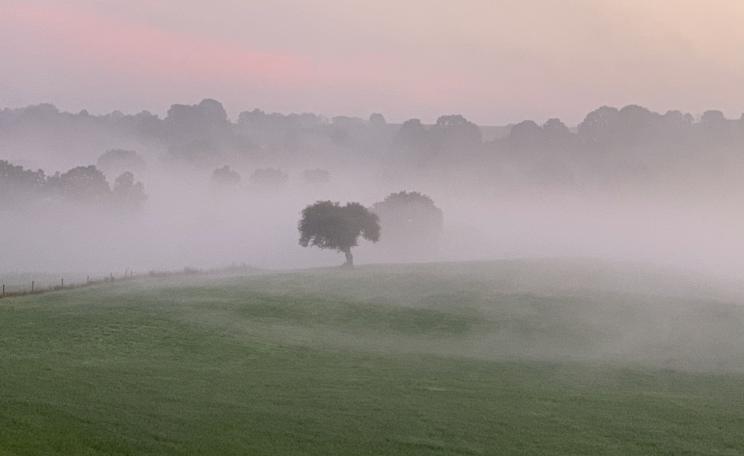Mangos do not pollute, leave plastic in the ocean, make carbon emissions and climate change: how many of your products are like mangos?
"Love is the foundation on which you should build your life. Love at every level. Put Love first then democracy, love first then truth, love first before science, business and technology." This is one of the central ideas that form the basis for Satish Kumar's latest book Radical Love.
Satish was invited to visit Brazil for a two-week trip to mark the publication of this book Radical Love and launch a feature length documentary about his life with the same title from the director Julio Hey.
Satish embodies the pilgrim he writes about offering words of goodwill and encouragement as much to his intimate circle of friends as to the strangers he meets. His demeanour of hope and optimism is magnetic, and for two weeks I was totally immersed in this 'Brazilian amor radical'.
Tears
At 87 years old, Satish is still as full of energy and passion as he was in 1962 when he walked to the four nuclear capitals of the world. He speaks to large gatherings without notes for up to an hour, with deft oratorial skills and charisma. "I will be an activist until my last breath" he says.
Picture as a backdrop Sao Paolo, with a population of 22.8 million people - the fifth largest city in the world. Like all cities of that size, it suffers from extensive air, water, and noise pollution. Vast tree roots and plants overhead intermingle with electrical wiring in dystopian harmony. Nature is omnipresent, waiting to reclaim the land back to Atlantic Forest.
Satish skilfully adapts his philosophy and teaching to the place he is in. "Why are we all cramming ourselves into cities? Everyone should have a garden and grow their own food", he states to an audience of successful entrepreneurs.
He coins a new analogy during his teaching in Brazil: "the mango economy'. "Mangos do not pollute, leave plastic in the ocean, make carbon emissions and climate change. The investment of one mango seed returns thousands of new seeds! How many of your products are like mangos?"
Satish challenges his audience to collaborate not compete, and practice regenerative economy. This discourse is powerful and moving, audience masks begin to fall away, fears dissipate, tears are shed.
Rewilded
As well as from Jain and Gandhian roots, Satish's core philosophy has been inspired by the figure of the 'mother'. This is beautifully illustrated in Julio Hey's documentary film. He has been profoundly influenced by the women in his life: his mother, his wife June, and of course Gaia herself.
He laments the long suppression of what is often assumed to be core feminine qualities such as nurturing, intimacy, and softness - the lack of which has brought us to the cliff edge of ecological collapse. Globally, millions of women have embraced the ecological emergency, showing courage, diplomacy and wisdom in reconciling future challenges.
Mangos do not pollute, leave plastic in the ocean, make carbon emissions and climate change: how many of your products are like mangos?
This was echoed by the female enthusiasts for Satish's teaching in Brazil. Most of the conferences during our tour were led by women leaders: Andrea Kestenbaum, CEO of Positive Ventures, Patricia Ellen da Silva, Head of Systemiq Ltd in Brazil, Fernanda Guerra, lawyer and founder of Conscious Contracts, and Bia Tadema, CEO of Escola Schumacher.
No trip to Brazil would be complete without visiting the magnificent landscape of which, considering Brazil is three times the size of India, there is an abundance.
We were invited for a 3-day visit to Ibiti in Minas Gerais, where 6000 hectares of Atlantic Forest is slowly being completely rewilded. It is the life project of owner, Renato Machado, who started Ibiti in 1982.
This expansive environmental operation includes a monkey sanctuary for the endangered Muriqui monkey, a project for research and conservation of the cougar, a refaunation programme, a wild animal release area, a recently opened orchid house, and provides sustainable support for the whole resident community.
Satish watched the film of his life for the first time at Ibiti at a special outdoor screening by a beautiful lake with every detail considered: deckchairs, blankets for the humidity, and vegetarian food provided by the talented chef Daniela Rosa.
One of the main focusses of the trip was for Satish to meet and share ideas with activists in Brazil. His first encounter was with a group of young Indigenous activists: Amanda Costa, Thiago Guarani, Cleidiana Carvalho, Natalha Theofilo, Waja Xipai and many others who are united in their deep dissatisfaction with the treatment of Indigenous peoples by successive governments.
They seek recognition of their culture, lands, and Indigenous status. Matters have recently shifted since Brazil's first Indigenous minister Sônia Guajajara was appointed.
Guajajara has provided Indigenous peoples some long needed political traction. Satish embraced their core message at the meeting, adding also that "love is the most potent tool for transformation". From the post-meeting online activity this message seemed to resonate deep in the hearts of this new generation of activists.
Benevolence
In Rio de Janeiro, Satish met for discussion with two Brazilian legends of his own generation, Gilberto Gil and Ailton Krenak. These conversations were more philosophical in tone covering the idea of separation as seen from their different cultural perspectives - African, Indigenous and Indian.
Ailton Krenak added a reflection on wind: "Our ancestors gave importance to the wind. They taught that the wind is an entity, different from the idea that people have that it is just an element of nature, just like the waves of the sea, the ray of the sun.
"We learned that it is this entity that communicates with us, heals, moves, and gives meaning to life. It is very close to the idea of angels that the Westerners brought here. They move all the time around us like consciousness, they have consciousness, it has consciousness, we are talking with them who are in the wind."
The launching of the book Radical Love was probably the headline event for our trip held in a state-run theatre in Sao Paulo. Introduced by presenter Caze Pecini, Satish was given a standing ovation when he walked on stage. He spoke so passionately about his life, mission and message, which seems to resonate deeply in the hearts of Brazilian audiences.
This is probably why Escola Schumacher has been able to run 70 courses with more than 7,000 students in just ten years. This anniversary that was celebrated in true Schumacher style with a fireside chat, poetry, song and wholesome vegetarian food.
Satish's visit created a huge wave of genuine goodwill and benevolence, planting seeds for the future. Escola Schumacher intends to create a foundation of trustees and benefactors with the first objective of setting up a permanent home for the school. There is a groundswell of momentum, Brazil is ready for change.
This Author
James P Graham is an artist and an eco-activist. He is a former trustee of the Resurgence Trust. Satish Kumar is a member of the management team of the Resurgence Trust. The funding for the trip was provided by Ibiti and the Escola Schumacher community in Brazil. The Resurgence Trust owns and publishes The Ecologist online.








